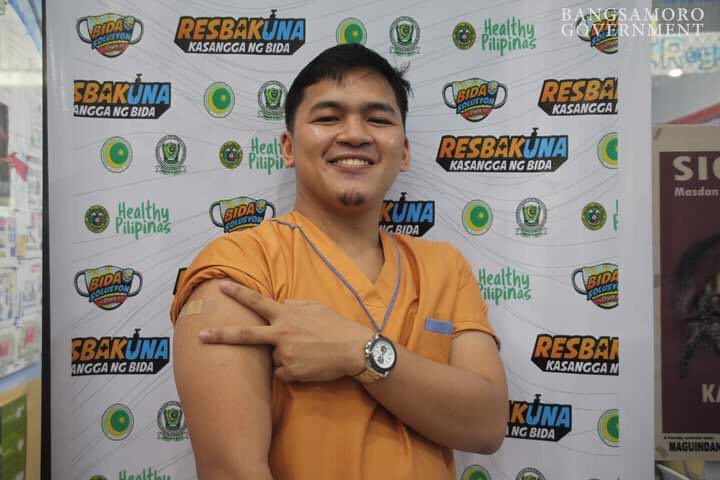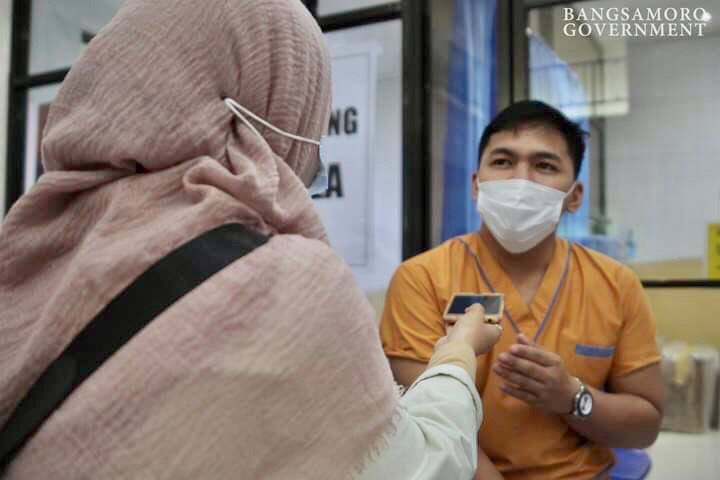
On March 5, 2021, nurse Abdulah—one of the 300 health workers from IPHO Maguindanao—received his first shot of Sinovac vaccine. Four weeks after the first dose, Abdulah and his colleagues will receive their second shots of the jab.
The prevalence of Coronavirus Disease (Covid-19) worldwide has unfolded horror, especially for nurses who stand at the front line.
The much-awaited vaccine for Covid-19 has already been rolled out to different parts and regions of the globe. In the southern part of the Philippines, the brand Sinovac vaccine was first to arrive in Bangsamoro Autonomous Region in Muslim Mindanao (BARMM).
Because of the limited supply of vaccines, frontliners such as health workers are on the masterlist to be immunized first.
Johaer Abdulah, 25, a nurse from Integrated Provincial Health Office (IPHO) in Maguindanao, described his experience during the new normal as “undoubtedly distressing”.
“Simula noong nagkapandemic, naging mabigat talaga ang trabaho ko, iyong workload ko—ibang iba sa normal days. Maraming pagbabago, kasi bago iyong sakit; at sa pag-adapt pa lang ng bagong system, nahirapan talaga ako,” Abdulah said.
(When the pandemic started, my workload became extra heavy—very different from the normal days. A lot has changed, because it’s a novel disease; and when it comes to adapting to the new system, I really had a hard time.)
He recounted it has been tough for him and his family, because he always needed to make sure that all of them are safe from getting infected.
“Dati umuuwi ako sa bahay araw-araw, pero noong nagka-pandemic, minsanan na lang o pagkatapos ng dalawang linggo saka ako makakauwi, kasi sinisigurado ko naman ang kaligtasan ng pamilya ko,” he explained.
(I used to come home everyday, but when the pandemic began, coming home was not as often as it used to be. I go home only after two weeks to ensure my family’s safety.)
Giving it a “shot”
Weeks before vaccines arrived in the Philippines, fears and rumors have been circulating that the vaccine is not safe and effective, and that it may aggravate the health situation.
Despite this, health workers, like Abdulah, gave it a shot and signed the waiver for inoculation.
“Sa una, kinakabahan ako. Then, after the vaccination, masaya ako, dahil naging parte ako ng unang nabakunahan dito sa rehiyon (BARMM),” Abdulah said, noting he was aware of the possible adverse reactions.
(I was anxious, at first. Then, after the vaccination, I felt happy, because I became part of the first batch to get inoculated here in the region.)

For Nurse Abdulah, the roll-out of vaccines in the Bangsamoro region signals hope that one day, Covid-19 pandemic will come to an end.
A beacon of hope
According to Abdulah, prioritizing the frontliners to get vaccinated serves as a “stepping stone for the government in beating Covid-19”.
He expressed his gratitude to the Bangsamoro Government, Ministry of Health (MOH), and IPHO Maguindanao for giving priority to the frontline health workers in the region.
He also encouraged the Bangsamoro people to participate in this campaign.
“For those who are hesitant to be vaccinated, do not be afraid. Let’s be part of the solution,” he stressed.
“As a health worker, I want to be a role model. Bilang isa sa unang nabakunahan ng Sinovac vaccine, gusto kong ipaalala sa kanila na ‘di tayo dapat nagpapatalo sa mga negatibong bagay,” Abdulah added.
(As one of the first health workers to receive Sinovac vaccine, I want to remind them that negative things should not beat us.)
Abdulah urged his fellow health workers to continue observing minimum public health –standards such as physical distancing, frequent handwashing, wearing of mask, face shields, and other personal protective equipment– even after getting vaccinated.
Along with the arrival of Covid-19 vaccine in the region is the hope for our health workers that one day, we will beat Covid-19 and will soon live a normal life, again. (Bangsamoro Information Office)
![]()







